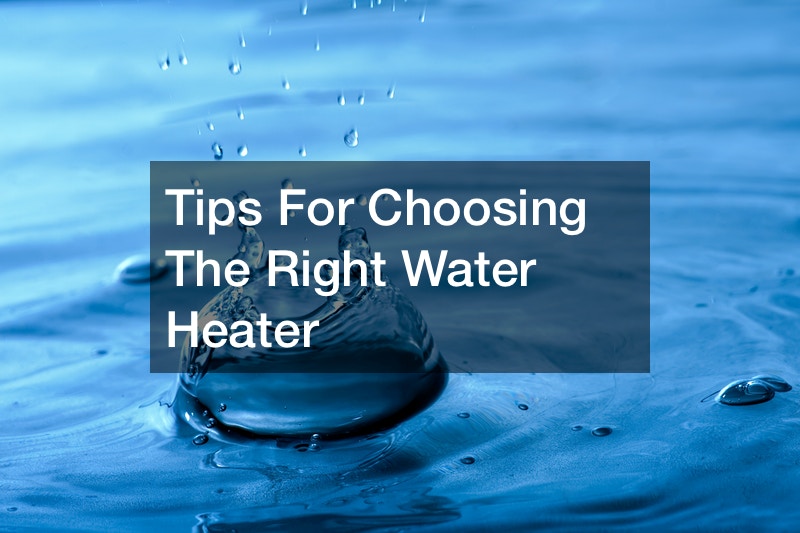
Tips For Choosing The Right Water Heater

Water heaters are the heart of a household’s hot water system. It is important to understand how it works and some do’s and don’ts for maintaining this appliance to get the most out of your home water heater, for instance, how often you should conduct water heater repair. Many factors also need to be incorporated when shopping for a water heater. Understanding the different models available can help you make the best choice for your home, budget, and family needs. Here are several tips to help you choose the right water heater:
Decide on Your Water Heating Needs
Before starting to shop for a water heater, it is important to decide your need. If you are new at home and don’t have kids yet, perhaps you need a small capacity heater. This enables homeowners to save more by reducing the risk of overspending since they cannot depend on the daily hot shower. Also, consider if they only use water to take baths, do dishes and laundry, etc.
If your family is growing and people want their showers every morning, you should consider getting standard units with large capacities depending on how big your household is. The size of a water heater is measured in gallons. A good standard for a household with two to three people is 50 to100-gallon capacity. If you have a smaller or bigger family, consider getting a larger one.
A tankless on-demand heater is the best option for those who want convenience and maximum savings. You need to switch it on when you need hot water since it heats up immediately. This water heating method saves more energy than storage heaters because there’s no time wasted on too much heat loss from standby. You can also save up to 50 percent on your annual energy bills with a tankless water heater.
Determine Your Water Heater Fuel Type
When choosing the best type of water heater for your home, there are four major fuel sources available. Each has its pros and cons related to cost, efficiency, comfort, convenience, availability, environmental impact, hot water heater installation requirements, and maintenance required. The more you know about each type of water heater, the easier it will be to decide on the best one for you. Here are some details about each option:
Gas heaters are more efficient than other types but may require more expensive repairs if they’re not installed properly, or their parts aren’t maintained regularly.
Heat pump water heaters provide the most convenient and comfortable hot water and are one of the most efficient models available. However, they can be expensive to install and often don’t offer enough energy savings to justify their cost in areas with low electricity prices.
Solar water heaters use renewable resources to provide hot water that is inexpensive to produce but relatively expensive to buy and maintain. This makes them best suited for remote homes off the main power grid, where their benefits outweigh the costs of paying for hot water heater services or buying parts online.
Electric heaters are less expensive than other options but usually lack gas and propane units’ efficiency and convenience benefits. They may also pose a safety hazard because no pilot light or vent is required.
Evaluate Your Heater’s Energy Usage Statistics
Recent studies have revealed that household appliances such as water heaters consume the most energy in homes. According to these reports, water heaters account for about 30% of monthly home energy use and 13% of monthly power generation.
To determine which water heater is right for you, you should first assess how much hot water your home uses. An average family uses 50-100 gallons per day, but the family size and lifestyle influence that number. For example, a larger family or people who take long showers will need a more powerful tank than a single person. Nationally, many older houses have insufficient 40-gallon tanks used by large families.
In terms of how much energy it takes to heat the water, tankless models are more efficient than storage water heaters because of their fast recovery rate – the amount of time it takes for hot water to be available again after use. A storage heater’s recovery rate depends on its size and insulation, but on average, they require 4kWh per 50 gallons of capacity per day.
If you use more than 50 gallons of hot water per day, a tankless hot water heater is recommended. These models offer significant energy savings and reduce your carbon footprint and monthly gas or electric bills.
Assess Your Water Heater Installation Requirements

A skilled plumber can install a water heater in a time flat. But you might not be so lucky, particularly if your home was built inappropriately and you have an older water heater that needs to be rerouted or drilled into due to certain issues such as hot water heater leaking.
If your plumbing challenge is more complicated than usual, it’s important to correctly size the heater and ensure that it will fit in place once installed. Even if you’re installing a new tank, you need to know whether your water supply is sufficient for the heater and how much room your system requires. Sizing is especially important when considering fast recovery or high-efficiency water heaters, which use larger elements and therefore need extra room for ventilation. Therefore, before you call for 24 hour emergency plumbing for the final heater installation, assess your home’s specific heater installation requirements.
Consider Your Water Heater Maintenance Requirements
Before purchasing your water heater, you must consider your maintenance requirements; doing so will help you ensure that your heater is compatible with its environment and can handle any unpleasantries lurking nearby.
For example, if you live in an area with high humidity, the water heater will need to be able to dry out after use. If you have a home office, it would also be helpful for the heater to have an energy-saving mode that, when activated, automatically reduces energy consumption when not in regular use.
These are just two examples of the requirements that should be considered before making your purchase, but they are not exhaustive since there are other essential maintenance requirements, such as scheduling water heater repair. Fortunately, there are several online resources where people can get free quotes from trustworthy companies that know all about water heaters and what they need to maintain their functionality throughout their lifespan.
Review Your Water Heater Warranty Coverage
As with any home appliance or device used often, there is always a chance that something might go wrong and break them down. Having the necessary warranty information can help you get back up and running as soon as possible.
To determine whether or not you have the proper coverage on your home, look at what type of warranty is included with your water heater model. Most manufacturers will provide a standard one-year warranty, but some offer better protection depending on the damage done and if they were installed by a professional or not.
The length of time you have to make a claim also depends on each company’s policy, so check before making any purchases. If you don’t think it’s worth paying for extra insurance for something like a water heater, it might be best to go ahead and install self-explanatory devices such as light bulbs or other small appliances.
The warranty will also vary depending on your area because flood damage is a greater risk in places with a higher chance of flooding. Some cities and states require homeowners to have flood insurance if they want their property covered for losses caused by water damage, so do check with your local government before having any work done on your house. Doing so beforehand can help prevent possible issues from arising later down the road if you haven’t been able to find an insurer who would provide adequate home flood coverage at an affordable price.
A warranty will help you avoid the hassle of having to pay for water heater repair or replacement parts yourself, but it can also save you a lot of money, depending on your situation. Spending extra on appliances that aren’t covered by warranty can easily amount to hundreds if not thousands in repairs and replacement costs.
However, when all is said and done, how well each water heater holds up over time matters even without any additional protection. Although factors may affect its longevity, such as rusting or degradation, these occurrences are often unforeseeable, so doing your research beforehand will ensure that you don’t end up with something much worse than what you initially had before.
Consider Your Water Heater Efficiency Requirements
Many homeowners find themselves in need of a new water heater. While the main factors which will be considered are the heating needs and fuel type, other considerations can help you determine what kind of water heater best suits your needs. One question that should be asked is whether or not your home needs an energy-efficient model for environmental purposes or if you want to save money on monthly bills.
Those who choose energy efficiency know that out of all types of heaters, gas emits the least carbon dioxide while electrical models release carbon dioxide at twice the rate as gas units. If you buy an electric model, ensure it meets the necessary guidelines to operate efficiently.
For those who want to save money, while gas-powered heaters are the most efficient, they also cost considerably more than their electrical counterparts. If you choose an electric model, keep in mind that water heater tanks generally are sized in gallons, and the higher the gallon rating, the greater your energy costs. Therefore, homeowners should consider buying a lower-gallon water heater to save money on monthly bills since increasing energy efficiency slightly outweighs paying less for each hot water unit.
Gas heaters continue to provide the highest efficiency level; however, depending on where you live, it could take several days or even weeks to get your hot water which is not the case with electric models.
Evaluate Your Water Heater’s Operating Costs Over Time

Living in a home without a water heater is unthinkable for most people. While it may seem simple, there are many types of water heaters to choose from. Knowing the different types and understanding their operating costs can help you find the right appliance for your needs.
A standard storage-tank water heater uses a large tank and heated coils to heat water. The cost of operating this type of heater is usually determined by the size and volume of your household’s hot water usage, which can vary significantly between households that use their appliances differently. If you own or rent an older home with limited hot-water options (e.g., only one faucet), expect to pay more using a standard storage-tank water heater than someone with multiple bathrooms and fixtures. A drawback to storing water in the tank is that it reduces overall space within the appliance for heating and energy efficiency purposes because so much room must be given over to its size and volume; think extra living space for your water heater.
Storage tank water heaters come in two types: gas-fired and electric. Gas units cost less to operate but are more prone to breaking down or requiring repair than electric units, making them more expensive. The upside of using natural gas is that it burns cleaner than kerosene or propane, contributing to a healthier household environment.
Electric storage-tank water heaters are much less expensive to install and maintain, but they use significantly more energy than their counterparts (and therefore increase your monthly power bill). An electric tank is a good place to start if you’re looking for an environmentally friendly option that won’t break the bank.
When shopping for a new water heater, there are several things to consider before deciding which model is right for your home. Some of the most important factors include the installation requirements of each unit, its warranty coverage, and its operating costs. By considering these tips, you can choose an appliance that will provide you with years of heating service while keeping your utility expenses low.

Bathroom Remodel Time-Lapse



